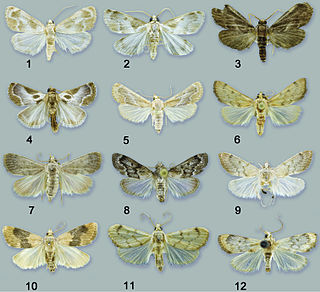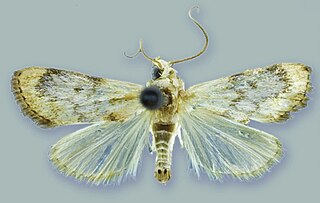Protrigonia is a monotypic moth genus of the family Crambidae erected by George Hampson in 1896. It contains only one species, Protrigonia zizanialis, described by Charles Swinhoe in 1886, which is found in Sri Lanka and western India.

Schacontia is a genus of moths of the family Crambidae described by Harrison Gray Dyar Jr. in 1914.

Palpita maritima is a moth in the family Crambidae. The species was first described by J. Bolling Sullivan and Maria Alma Solis in 2013. It is found in the United States in Alabama, North Carolina and Florida. The habitat consists of coastal maritime forests.

Schacontia medalba is a moth of the family Crambidae described by William Schaus in 1904. It is found in Brazil and Peru.

Schacontia chanesalis is a moth of the family Crambidae described by Herbert Druce in 1899. It is found in Mexico, Guatemala, Costa Rica and Venezuela.

Schacontia umbra is a moth of the family Crambidae described by Maria Alma Solis and Paul Z. Goldstein in 2013. It is found in central Ecuador.

Schacontia speciosa is a moth of the family Crambidae described by Maria Alma Solis and Paul Z. Goldstein in 2013. It is found in south-eastern Brazil.

Schacontia themis is a moth of the family Crambidae described by Maria Alma Solis and Paul Z. Goldstein in 2013. It is found on the Cayman Islands and in Brazil, Costa Rica, Cuba, the Dominican Republic, Florida, Jamaica, Mexico, Panama, Puerto Rico and Venezuela.

Schacontia rasa is a moth of the family Crambidae described by Maria Alma Solis and Paul Z. Goldstein in 2013. It is found in Mexico, Cuba and the Dominican Republic.

Schacontia nyx is a moth of the family Crambidae described by Maria Alma Solis and Paul Z. Goldstein in 2013. It is found in northern Venezuela.

Schacontia lachesis is a moth of the family Crambidae described by Maria Alma Solis and Paul Z. Goldstein in 2013. It is found in central Brazil and Bolivia.

Schacontia atropos is a moth of the family Crambidae described by Maria Alma Solis and Paul Z. Goldstein. It is found in northern Venezuela.

Schacontia ysticalis is a moth of the family Crambidae described by Harrison Gray Dyar Jr. in 1925. It is found in Mexico, Costa Rica, Honduras, Nicaragua, Venezuela and Bolivia.

Glaphyriinae is a subfamily of the lepidopteran family Crambidae. It was described by William Trowbridge Merrifield Forbes in 1923. The subfamily currently comprises 509 species in 75 genera.
Scoparia crypserythra is a moth in the family Crambidae. It was described by Oswald Bertram Lower in 1901. It is found in Australia, where it has been recorded from New South Wales.

Frechinia helianthiales is a moth in the family Crambidae. It was described by Mary Murtfeldt in 1897. It is found in North America, where it has been recorded from Arizona, Illinois, Manitoba, Missouri and Oklahoma, south to Mexico.
Criophthona finitima is a moth in the family Crambidae. It was described by Edward Meyrick in 1884. It is found in Australia, where it has been recorded in South Australia.

Metasia familiaris is a moth in the family Crambidae. It was described by Edward Meyrick in 1884. It is found in Australia, where it has been recorded from New South Wales and Tasmania.
Myriostephes haplodes is a moth in the family Crambidae. It was described by Edward Meyrick in 1887. It is found in Australia, where it has been recorded from Queensland.
Udea hyalistis is a moth in the family Crambidae. It was described by Oswald Bertram Lower in 1902. It is found in Australia, where it has been recorded from Victoria.















